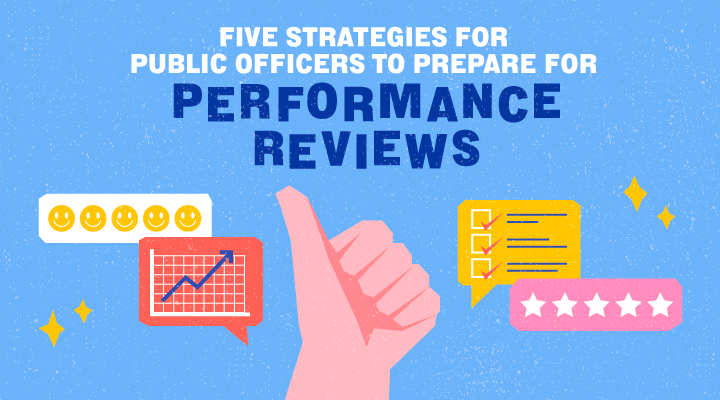Five Small Steps to Prep for Your Performance Review

3-minute read
“Success is the sum of small efforts,” as self-help author Robert Collier tells us. This applies to performance reviews as well.
Preparing for appraisal is all about documentation, so start your documentation right from the beginning of the year or as soon as you can! This way, you have plenty of time to reflect on your work, role in your agency, and be ready when appraisal season hits.
Here are five small, concrete ways to get yourself ready.

#1 Map out your KPIs for the year and measure your work against them
What are your key KPIs for the year? Amidst the busy-ness of everyday work, it is easy to lose track of what we have done and achieved. Start an excel sheet to list the projects you are assigned or involved in, and the KPIs for each project. Methodically input the work that you have done for each project and how you fare against the respective KPIs.

#2 Track all the “extra-curricular” work
As public officers, we may be called upon to support work that is not core to our roles, such as organising team-building events or staff retreats. While such work does not have KPIs attached, they require time and attention.
Most importantly, your participation shows that you are invested as a team-player and contribute to greater organisational good such as staff well-being and camaraderie. If you volunteer outside of work hours, highlight that as well, as public spiritedness is highly encouraged among public officers.

#3 Keep a log of your skills development
Writing classes, core skills workshops, technical training—upskilling and reskilling are a big part of public service. Maintain a log of your training, whether it is in-person or online learning, and list down the skills gained after each learning intervention.
In a separate column, monitor how you have applied those skills in actual situations and reflect on areas where you need further strengthening or upskilling. This would help you build the case for more targeted training for the next six months.
Pro tip: Where do you aspire to be in the next two years? What competencies would that version of you need? Envisioning your aspirations in concrete terms helps you to manifest them.

#4 Reflect constantly on your work performance
The performance review requires you to present your version of performance and achievements to your reporting officer. As such, build your self-awareness and make it a habit to reflect on your daily performance. In the pursuit of meeting KPIs, it is important to note that how you achieve them is just as important.
Here are some questions for self-reflection: What kind of challenges have you faced in your projects and how have you overcome them? What does your problem-solving style say about you as a team-player and employee? Does the way you work align with your agency’s mission and values?
Finally, make it a point to get feedback regularly from your colleagues, reporting officer, and other stakeholders to see how you are faring vis-à-vis their expectations and needs.
Take time to celebrate small wins!
Remember, growth is incremental. Take time to acknowledge your growth and progress, no matter how small. Striving for excellence is important, but so is recognising how far you have come. Be proud of your milestones and use them to fuel your motivation and job satisfaction.

#5 Document evidence of your work’s impact
Received accolades from the community on a programme that you’ve just conducted, or emails thanking you for your support in an interagency project? Record every bit of positive feedback on your work.
Also, where possible, set aside time to go beyond KPI tracking and quantify the impact of your projects, such as percentage increase in productivity, growth in community participation, or decline in complaints received.
By documenting your work on a regular basis, you are actively building your case for a great appraisal. Take a positive review as encouragement that you are heading in the right direction, and constructive criticism as actionable items!
- POSTED ON
Jan 28, 2025








